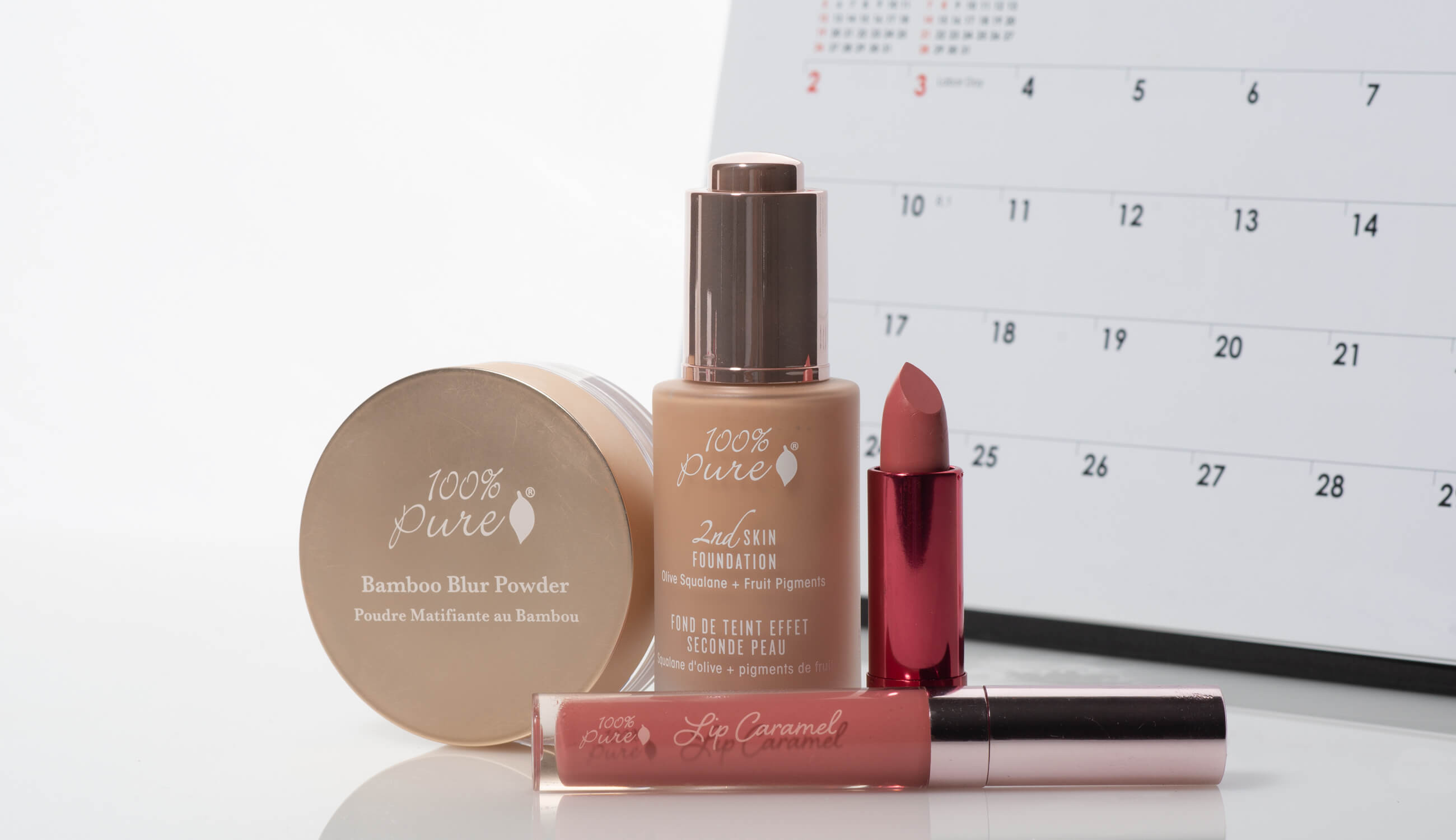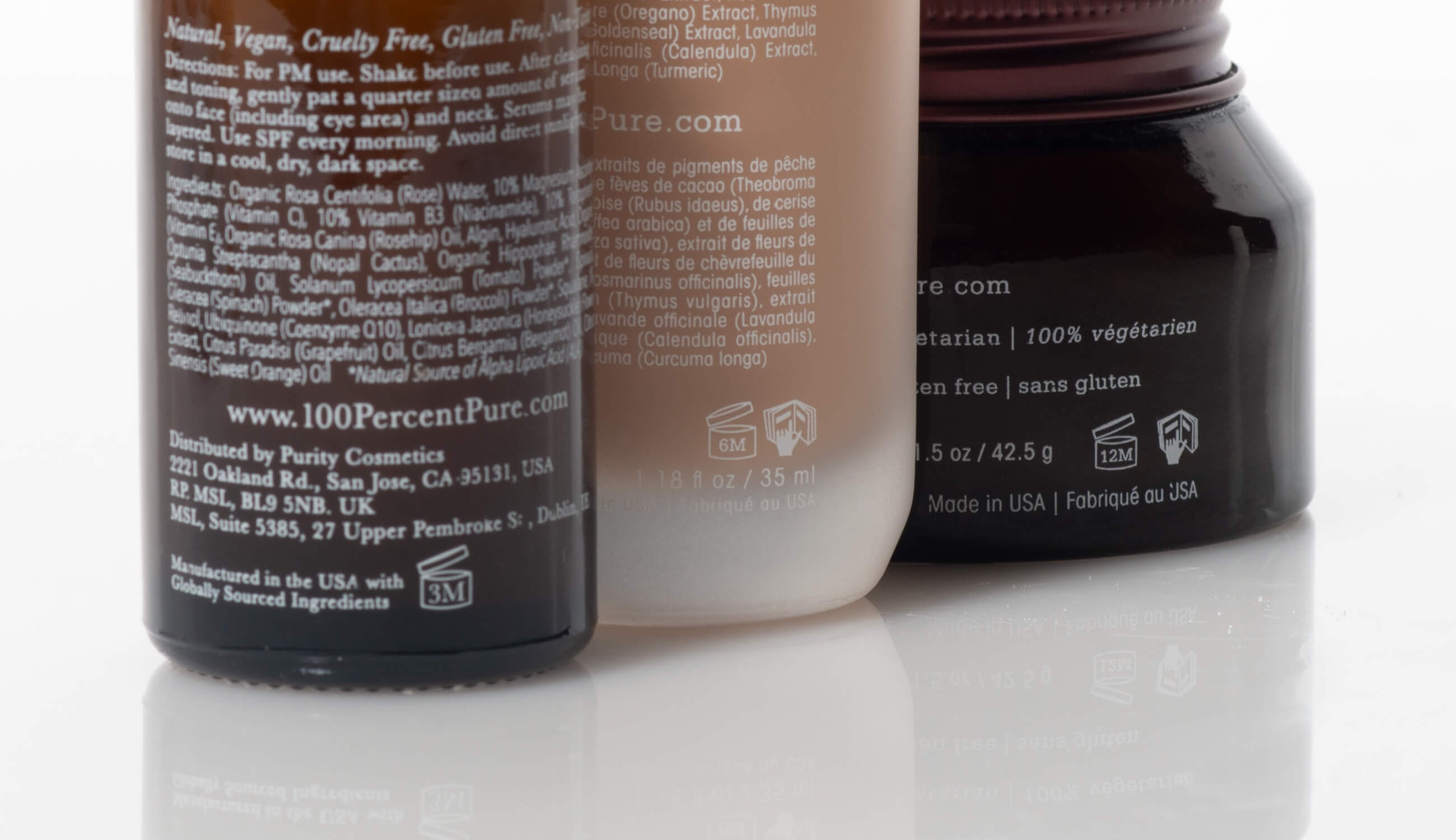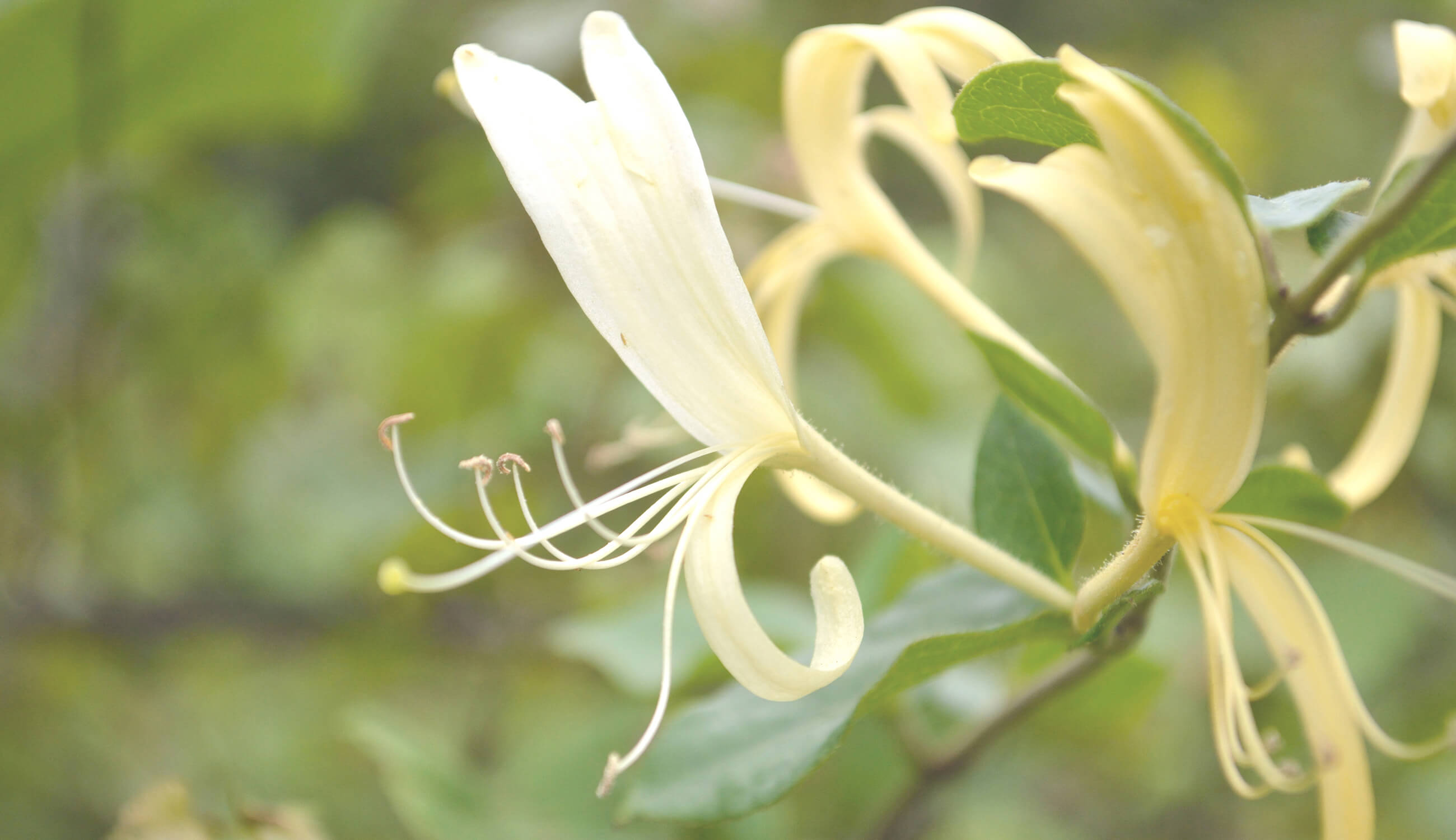How long natural makeup and beauty products are good for, and when to replace them
Written by: 100% PURE®
Wait a minute – are you still using that ‘special occasion’ lipstick from high school? Put down the bullet, because that lipstick is most definitely expired. It’s easy to forget that makeup doesn’t last forever, so we adopt an “if it ain’t broke, don’t fix it,” mentality. Harsh preservatives in most mainstream products mean they can live a half-life for months, even years past their prime (think of them as ‘zombie’ makeup). On the other hand, natural makeup products most definitely have a firm shelf life, and should be recycled and retired once they hit their expiration.
Natural and organic cosmetics contain ingredients derived from foods and plants. We use natural preservatives that help to enhance the performance of the product, without harming the skin. Think of natural makeup like food: it’s got preservatives to make it last, but you wouldn’t eat it past it’s expiration date. So how do you know if your product is no longer usable? Check out the guide below, including best practices and a quick list of ‘don’ts’ for natural beauty products.

Similar to a carton of juice or milk, our makeup products come with open-jar dates that dictate their shelf life once opened. When opened, oxygen interacts with the formulas and they immediately begin to degrade. Liquid and cream formulas have a naturally moist texture, making them bacterial breeding grounds once their preservatives are no longer effective (about 6 months). For mascaras, because bacteria are inserted inside the tube, 6 months is maximum while 3-4 is a better time frame. Foundations can last a bit longer if you practice safe sanitation, meaning no cross-contamination, closing lids tight, and storing in a cool, dry place.
Wondering where to find the dates on your bottles and jars? Most of us are so wowed by the pretty packaging that we never even notice the batch number included on all 100% PURE products. With a quick call to our customer service line, we can help you discover the date your product was made, and when to use it by.

Since au naturel is kind of our thing, we avoid parabens like we avoid bad selfie lighting. So we ditch the parabens, but we still need preservatives in our products to make sure they’re useful and safe for your skin. We love using natural preservatives like antioxidants, honey, Japanese honeysuckle, and tocopherol. Tocopherol is a natural form of vitamin E that helps protect our skin while preserving our products. Tocopherol is widely used in natural skin care and cosmetics, and is even used in food, as its often sourced from leafy green vegetables and soy beans. It’s important to note that while we do stabilize our products with these natural preservatives, open-jar and best-by dates should still be observed, as the preservative is already factored into the expiration date.
Newsletter Subscribe
for more blog updates and exclusive discounts
Do you want to know what’s worse than using expired makeup? It’s using expired makeup and having a negative reaction to it. As humans, we’re pretty resilient -- we face bacteria every day and live to tell the tale. Heck, we delight in eating cheese despite what it is (hint: it’s milk cured by mold). But then, once in a while, we use a product that pins us with an allergic reaction. In hindsight we knew it smelled funky, or that the texture was off, but we still used it.
Expired products are no longer guaranteed safe to use. The ingredients are no longer stable, and the effectiveness of the product is certainly questionable. Can you imagine applying an expired liquid lipstick on your mouth, knowing how much of it you might be ingesting while you wear it? The skin on our faces, and our eye area in particular, is much more sensitive to this kind of exposure than our stomach is to a little funky cheese. Never use expired shadows, liners, or mascaras around the eyes. And certainly do NOT share your natural makeup products! Sharing is caring, but when it comes to makeup, sharing means sharing germs and bacteria, too.
We know how hard it is to remember when something was opened or when to use it by, so we’ve got a few helpful tips to make things a little bit easier.
Sticker Products After Opening
Use color coded stickers to determine open dates. You can use stickers that match up with a month calendar, or simply write the open date on the sticker before placing it on the jar or bottle.
Keep Products Cool
Store all of your makeup in a cool, dry and shaded place. Light, heat and moisture are the main culprits to bacterial growth, so the perfect conditions will keep your products performing at their best for longer. Cool temperatures also put bacteria in stasis, which explains why frozen food is such a nifty way to make fresh food last for months or years.
Use a Palette for Mixing
Never mix your products in the container! For those of us that wear two foundation shades, or are customizing to treat our summer tan, scoop them out with a clean spoon and mix on a separate palette surface. Even under the best possible conditions, the minerals, pigments, and ingredients are likely to be different and potentially incompatible. You also pose the risk of transferring bacteria from one product to another.
Shake Before Use
Shake liquid products before every use, or stir if the product is in a tube with a wand. We’ve all found an old foundation at the bottom of our makeup bag or hiding on our vanity that’s got that weird discoloration. If a product sits in the same position for a long time, it is possible the ingredients will start to separate over time. Shaking and stirring keeps all the ingredients mixed together and ensures you’re not getting a blob of goo where you wanted cream concealer.
Sanitize Regularly
You should occasionally spray your cream and powder products with 99% alcohol. Though this grade of alcohol can be a bit more challenging to find, it is one of the ways that makeup artists sanitize their products between clients. Not only does it remove bacteria that develops on the product over time, but it can help kill the bacteria we might be transferring to our products during application.
We include natural ingredients because they work – but this means that when natural products expire, they go bad (just like any food item). Would you rather have harsh, synthetic, and toxic ingredients on your skin, doing long-term damage to your body and the environment? Or simply have to throw out your nearly empty natural foundation once in a while? The choice is yours, but we know what we would do.
What do expiration dates on natural makeup products mean?
Expiration dates indicate the recommended timeframe within which the product should be used for optimal performance and safety. It is a guideline provided by the manufacturer to ensure the product's effectiveness and stability.
How important is it to pay attention to expiration dates on natural makeup?
It is crucial to pay attention to expiration dates on natural makeup to maintain its quality and ensure that it remains safe for use. Expired products may lose their effectiveness, change in texture or color, and could potentially harbor harmful bacteria.
Can natural makeup products expire faster than conventional ones?
Natural makeup products, especially those formulated with organic or plant-based ingredients, may have a shorter shelf life compared to conventional ones. This is because they typically contain fewer synthetic preservatives, making them more susceptible to natural degradation over time.
How can I tell if my natural makeup has expired?
Signs of expired natural makeup can include changes in texture, unusual odor, separation of ingredients, or a noticeable difference in color. Additionally, if the product causes any skin irritation or does not perform as expected, it may be an indication of expiration.
Are there any potential risks or side effects of using expired natural makeup?
Expired natural makeup can potentially cause skin irritation, allergic reactions, or infections due to the growth of bacteria or mold. It's important to discard any expired products to minimize the risk of adverse effects on your skin or overall health.
We carefully hand-select products based on strict purity standards, and only recommend products we feel meet this criteria. 100% PURE™ may earn a small commission for products purchased through affiliate links.
The information in this article is for educational use, and not intended to substitute professional medical advice, diagnosis, or treatment and should not be used as such.

